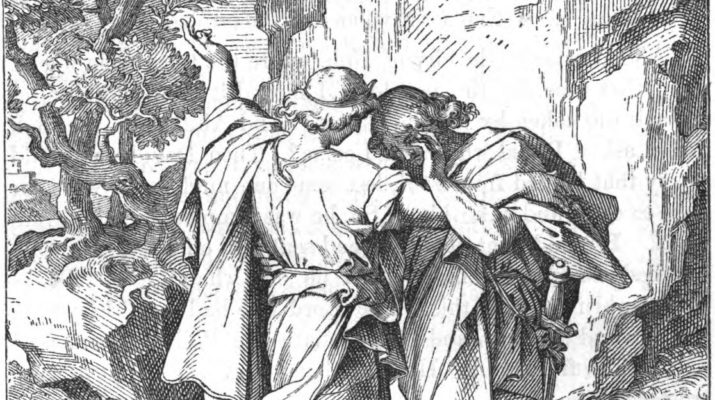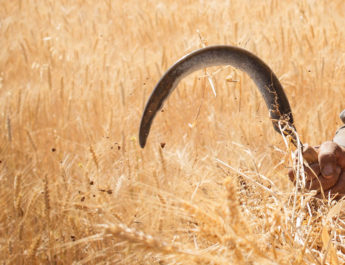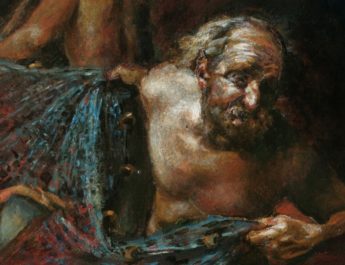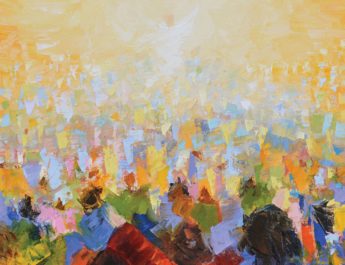2 Samuel 1:1, 17-27
Ordinary B31
1 AAfter the deathB of Saul,C when DavidD had returnedE
A {untranslated} = hayah. This is to be or become, to happen.
B “death” = mut. This is to die in a literal or figurative sense. It can also refer to being a dead body.
C “Saul” = Shaul. From shaal (to ask, inquire, beg, borrow, desire, request; can also mean demand). This is Saul or Shaul, meaning “asked of the Lord.”
D “David” = David. From the same as dod (beloved, love, uncle); the root may mean to boil, which is used figuratively to describe love. So, this implies someone you love such as a friend, a lover, or a close family member like an uncle. David’s name likely means something like “beloved one.”
E “returned” = shub. To turn back, return, turn away – literally or figuratively. Doesn’t necessarily imply going back to where you started from. This is also the root verb for the Hebrew word for repentance “teshubah.”
from defeatingF the Amalekites,G David remainedH twoI days in Ziklag.J
F “defeating” = nakah. This is to hit whether lightly or severely. It can be used in a literal or figurative sense. So, this could be beat, punish, give wounds, kill, or slaughter.
G “Amalekites” = Amaleq. Perhaps from amal (to work – hard labor) OR from am (people or nation; a tribe, troops or armies, or figuratively to refer to a flock of animals); {from amam (to darken, hide, associate; creating shadows by huddling together)} + laqaq (to lap, lick) OR from am (see above) + malaq (to wring, nip; to remove a bird’s head). This is Amalek or Amalekite. It may mean “people that wring,” “people that lap,” “nippers,” or “lickers.” See https://www.abarim-publications.com/Meaning/Amalekite.html & https://www.abarim-publications.com/Meaning/Amalek.html
H “remained” = yashab. This is to sit and so to remain and so to dwell. It is sitting for any reason – as a judge, in order to ambush, or just sitting quietly. Causatively, this can mean settling or marrying. This can also mean continue, endure, or establish.
I “two” = shenayim. From sheni (double, again, another, second); from shanah (to fold, repeat, double, alter, or disguise). This is two, both, second, couple.
J “Ziklag” = Tsiqelag. 15x in OT. Perhaps from tsuq (“to smelt copper”) + log (pint). This is Ziklag, a city whose name may mean “a pint of liquid metal,” “winding,” or “outflowing of a fountain.” See https://www.abarim-publications.com/Meaning/Ziklag.html
17 David intonedK this lamentationL over Saul and his sonM Jonathan.N
K “intoned” = qonen. 8x in OT. From qinah (dirge, lamentation; could be a lament with instruments or done while beating one’s breasts). This is a chant or song of lament – the wail during a funeral. It can also refer to mourning women.
L “lamentation” = qinah. Related to “intoned” in v17. 18x in OT. See note K above.
M “son” = ben. From banah (to build or obtain children). This is son, age, child. It is son in a literal or figurative sense.
N “Jonathan” = Yehonathan. Related to {untranslated} in v1. From YHVH (proper name of the God of Israel; God, Lord; the self-existent or eternal one); from havah (to become) or hayah (see note A above)} + natan (to give, put, set, offer; to give literally or figuratively). This is Jonathan or Jehonathan, which means “the Lord has given.”
18 (He ordered that The Song of the BowO be taughtP to the peopleQ
O “Bow” = qesheth. Perhaps from qush (to set a trap, lure, ensnare) OR from qashah (to be fierce, cruel, dense, tough, severe). This is a bow, arrow, or archer. Bow can be used figuratively for strength.
P “taught” = lamad. Properly, this refers to goading (using a pointed stick to guide or prod one’s flock). By implication, it means teaching or instructing.
Q “people” = ben. Same as “son” in v17. See note M above.
of Judah;R, S it is written in the BookT of Jashar.)U He said:
R “Judah” = Yehudah. Probably from yadah (to throw one’s hands into the air in a gesture of praise); from yad (hand). This is Judah, meaning “praised.”
S {untranslated} = hinneh. From hen (lo! Behold! If, though; an expression of surprise). This is to draw attention, show suddenness or surprise, or to emphasize the importance of the coming statement. See! Lo! Behold!
T “Book” = sepher. Perhaps from saphar (to tally or record something; to enumerate, recount, number, celebrate, or declare). This is can be writing itself or something that is written like a document, book, letter, evidence, bill, scroll, or register.
U “Jashar” = Yashar. From yashar (to be straight, right, even, smooth, or agreeable; figuratively, to make something pleasant or prosperous). This is straight, right, level. Also, it is pleasing, whether pleasing God or pleasing other people. So, it is upright or righteous.
19 Your glory,V O Israel,W lies slainX upon your high places!Y
How the mightyZ have fallen!AA
V “glory” = tsbiy. From tsabah (to swell, amass like an army). This is beauty, honor, glorious, pleasant. It could refer to a decoration that is silver or gold. It can refer to a gazelle as something that is beautiful or splendor is being readily noticed.
W “Israel” = Yisrael. From sarah (to persist, exert oneself, contend, persevere, wrestle, prevail) + el (God or god). This is Israel, meaning God strives or one who strives with God; new name for Jacob and for his offspring. This refers to the people and to the land.
X “slain” = chalal. From chalal (to pierce, to wound; figuratively, making someone or something profane or breaking your word; to begin as though one opened a wedge; to eat something as a common thing). This is to pierce, profane or pollute. It can also refer to slain or deadly.
Y “high places” = bamah. The root might mean being high. This is height, wave, or elevation.
Z “mighty” = gibbor. From gabar (to be strong or mighty; to prevail or be insolent). This is strong, mighty, or powerful. This can imply a warrior, hero, or tyrant.
AA “fallen” = naphal. This is to fall, whether by accident, to fall prostrate, or to fall in violent death. Figuratively, it can refer to personal ruin or calamity, a city falling, an attack or a falling away. It can also be a deep sleep or wasting away.
20 TellBB it not in Gath,CC
proclaimDD it not in the streetsEE of Ashkelon;FF
BB “tell” = nagad. This is to declare, make conspicuous, stand in front, manifest, predict, explain.
CC “Gath” = Gath. From the same as gath (wine press); {perhaps from nagan (to strike a stringed instrument, to pluck or play it)}. This is Gath, a Philistine city whose name means “wine press.” It shares a root with “Gethsemane.”
DD “proclaim” = basar. This is being a messenger, to publish, carry, or preach. Properly, this is being fresh, rosy or cheerful as one bearing news
EE “streets” = chuts. Root may mean to sever. So, this is something that is separated by a wall – the outside, the street, a field, highway, or abroad.
FF “Ashkelon” = Ashqelon. 12x in OT. Of foreign origin – Perhaps related to shaqal (to weigh, spend, trade). This is Ashkelon, a city whose name means “a weighing place,” “mart.” The words “scallion” and “shallot” came from the Latin version of Ashkelon (“Ascalonia”). Seehttps://en.wikipedia.org/wiki/Ashkelon
or the daughtersGG of the PhilistinesHH will rejoice,II
the daughters of the uncircumcisedJJ will exult.KK
GG “daughters” = bat. Related to “son” in v17. From ben (see note M above). This is daughter in a literal or figurative sense.
HH “Philistines” = Pelishti. From Pelesheth (Philistia); from palash (to mourn, wallow, maybe roll in). This is Philistines. Their name may mean “griever” or “burrower” or “weakener.” See https://www.abarim-publications.com/Meaning/Philistine.html.
II “rejoice” = samach. This is to rejoice or be glad. Properly, it is to brighten up in a literal or figurative sense.
JJ “uncircumcised” = arel. From arel (to strip or expose, restrain; to remove in a literal or figurative sense). This is uncircumcised, unskilled, exposed, forbidden.
KK “exult” = alaz. 16x in OT. This is to jump for joy, rejoice, triumph, or be jubilant.
21 You mountains of Gilboa,LL
let there be no dewMM or rain upon you,
nor bounteousNN fields!OO
LL “Gilboa” = Gilboa. 8x in OT. Perhaps from gal (wave, billow, rock pile; something rolled; a spring of water); {from galal (to roll, roll away, wallow, commit, remove; rolling in a literal or figurative sense)} + ba’ah (to inquire, search, boil, or swell out; figuratively, could be to sincerely desire). This is Gilboa, a mountain whose name may mean “fountain of ebullition.”
MM “dew” = tal. Perhaps from talal (to cover, roof, strew). This is dew or mist as something that covers plants.
NN “bounteous” = terumah. From rum (to be high, rise, exalted, become proud, display, offer, present, set apart, extol; to rise in a literal or figurative sense). This is offering, gift – a sacred offering. It could also be a tribute or a bribe.
OO “fields” = sadeh. This is literally field, ground, soil, or land. It can be used to mean wild like a wild animal.
For there the shieldPP of the mighty was defiled,QQ
the shield of Saul, anointedRR with oilSS no more.
PP “shield” = magen. From ganan (to surround, cover, defend, protect). This is a shield, defense, or figuratively a protector. It can also be used for a crocodile’s hide.
QQ “defiled” = gaal. 10x in OT. This is to abhor, defile, or reject.
RR “anointed” = mashiach. From mashach (to smear or anoint; to run oil on, to consecrate). This is the anointed or consecrated one. So, it could refer to a king, priest, or saint. It is also the root of the word “messiah.”
SS “oil” = shemen. From shamen (to shine, which implies being oily, growing fat). This is fat, oil, grease, olive oil – often with perfume. Used figuratively for fertile, lavish, rich.
22 From the bloodTT of the slain,
from the fatUU of the mighty,
the bow of Jonathan did not turnVV back,
nor the swordWW of Saul return empty.XX
TT “blood” = dam. Perhaps from damam (to cease, be or become mute, silent, still, cut off, hold peace, be astonished, die). This is blood, bloodshed, bloodguilt, lifeblood, and death. It is used for people and animals. More often blood from a wound or the blood of the innocent. Used figuratively for violence or for wine. Closely tied to life and death.
UU “fat” = cheleb. This is fat, finest, marrow. It is fat in a literal or figurative sense. It refers to the richest or best part.
VV “turn” = sug. 1x in OT. From the same as sug (to turn back, aside, or away; properly, to flinch, which implies moving away or going back; literally, can mean retreat or, figuratively, backslide i.e. apostatize). This is to turn i.e. retreat.
WW “sword” = chereb. From charab (to attack, slay). This is any sharp instrument like a sword, dagger, axe, or mattock.
XX “empty” = reqam. 16x in OT. From riq (this is to be empty or to make empty; also vanity, emptiness, something worthily, in vain); from ruq (to pour out in a literal or figurative sense, hence, to be or make empty). This is emptily, empty-handed, without cause, in vain, ineffectually, or undeservedly.
23 Saul and Jonathan, belovedYY and lovely!ZZ
In lifeAAA and in deathBBB they were not divided;CCC
YY “beloved” = aheb. This is to love, beloved, friend. It is to have affection for sexually or otherwise.
ZZ “lovely” = na’iym. 13x in OT. From na’em (to be pleasant or lovely; to surpass in beauty; to be delightful in a literal or figurative sense). This is sweet, lovely, or delightful.
AAA “life” = chay. From chayah (to live or keep alive literally or figuratively). This is alive, living, lifetime. It can also be used to describe someone’s age. It can refer to animals, plants, water, or a company or congregation of people. It is life in a very broad sense.
BBB “death” = mavet. Related to “death” in v1. From mut (see note B above). This can be death, deadliness, the dead, or the place where the dead go. It can be used figuratively for pestilence or ruin.
CCC “divided” = parad. This is to divide, break through, scatter, sever, stretch, to spread oneself, or to be out of joint.
they were swifterDDD than eagles,EEE
they were strongerFFF than lions.GGG
DDD “were swifter” = qalal. This is to be little, insignificant, swift. It can also mean to bring down in esteem, create contempt, curse.
EEE “eagles” = nesher. This is an eagle or vulture – some kind of large bird of prey. Its root may mean lacerate.
FFF “were stronger” = gabar. Related to “mighty” in v19. See note Z above.
GGG “lions” = ari. From arah (to gather or pluck). This is a young lion.
24 O daughters of Israel, weepHHH over Saul,
who clothedIII you with crimson,JJJ in luxury,KKK
HHH “weep” = bakah. This is to weep, complain, or lament.
III “clothed” = labash. This is to wrap around, which implies clothing oneself or someone else. This is wrapping around in a literal or figurative way.
JJJ “crimson” = shani. This is crimson or scarlet. It can also refer to the insect that the red dye is made from (coccus ilicis), the color of that dye, or things dyed with it (like thread).
KKK “luxury” = eden. 5x in OT. From adan (to luxuriate, revel; also, to be pleasant or soft). This is delicate, luxury, or a delight.
who putLLL ornamentsMMM of goldNNN on your apparel.OOO
LLL “put” = alah. This is to go up, approach, ascend, be high, be a priority; to arise in a literal or figurative sense.
MMM “ornaments” = adi. 13x in OT. From adah (adorning oneself with ornaments, decorate). This is decoration, beauty, jewels, ornaments, an outfit, something excellent.
NNN “gold” = zahab. Root may mean to shimmer. This is gold or something that has the color of gold like oil. It can also refer to a clear sky – to good weather.
OOO “apparel” = lebush. Related to “clothed” in v24. From labash (see note III above). This is clothing literally or figuratively. It can be used as a euphemism for a wife.
25 How the mighty have fallen
in the midstPPP of the battle!QQQ
Jonathan lies slain upon your high places.
26 I am distressedRRR for you, my brotherSSS Jonathan;
greatly beloved wereTTT you to me;
PPP “midst” = tavek. This is among, middle, in the midst, the center. Perhaps, properly, to sever.
QQQ “battle” = milchamah. From lacham (to eat or feed on; figuratively, to battle as a kind of consumption/destruction). This is battle, war, fighting, or one who fights (i.e. a warrior).
RRR “am distressed” = tsarar. This is to bind, restrict, narrow, be cramped, an adversary.
SSS “brother” = ach. This is brother, kindred, another, other, like. It is literally brother, but it can also be someone who is similar, resembling, or related to.
TTT “beloved were” = na’em. Related to “lovely” in v23. 8x in OT. See note ZZ above.
your loveUUU to me was wonderful,VVV
passingWWW the love of women.XXX
UUU “love” = ahabah. Related to “beloved” in v23. From aheb (see note YY above). This is love as a noun.
VVV “was wonderful” = pala. From pele (wonder, miracle, wonderful, marvelous thing). This is to be extraordinary, to arise, to be great or accomplish.
WWW “passing” = literally “more than.”
XXX “women” = ishshah. From ish (man); perhaps from enosh (human, humankind, mortal); from anash (to be weak, sick, or frail). This is woman, wife, or female.
27 How the mighty have fallen,
and the weaponsYYY of warZZZ perished!AAAA
YYY “weapons” = keli. From kalah (to end, be finished, complete, prepare, consume, spent, or completely destroyed). This is something that was prepared – any implement, utensil, article, vessel, weapon, or instrument. Also includes jewels, weapons, bags, carriages, and furniture.
ZZZ “war” = milchamah. Same as “battle” in v25. See note QQQ above.
AAAA “perished” = abad. To wander off, lose self. This implies to perish, destroy, die, vanish, or be broken or corrupt.
Image credit: “The Parting of David and Jonathan” from “The Story of the Bible from Genesis to Revelation” – author unknown, 1873.




